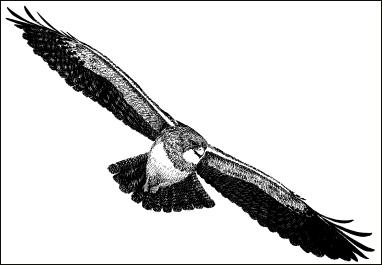

Have you ever noticed birds circling high in the sky, apparently without effort? They are using "thermals", masses of rising warm air. When a bird catches a thermal, it doesn't need to beat its wings, because the rising air keeps it soaring high above the earth!
One such bird, the Swainson's Hawk, has a dark breast, white belly, long wings, and a dark band at the end of its tail. They spend summers in the western United States, where they build simple nests high in solitary trees or shrubs. They raise two or three young, feeding them a wide variety of small animals.
Each fall, Swainson's Hawks migrate thousands of miles, but
recently many have died in their South American wintering grounds due to pesticide
poisoning. This is a case where it's not enough to take care of our immediate
environment. Many countries need to work together to save these magnificent creatures
that know no borders.

Listen to the Audio (mp3 format) as recorded by KTEP, Public Radio for the Southwest.
Contributor: Scott M. Cutler, Centennial Museum, University of Texas at El Paso.
Desert Diary is a joint production of the Centennial Museum and KTEP National Public Radio at the University of Texas at El Paso.

Swainson's Hawk in flight. Drawing © 1999 by Zackery Zdinak. Used by permission.
Sibly, D. A. 2000. The Sibley guide to birds. Alfred A. Knopf, New York, 544 pp.
Pesticides and Swainson's Hawk mortality.